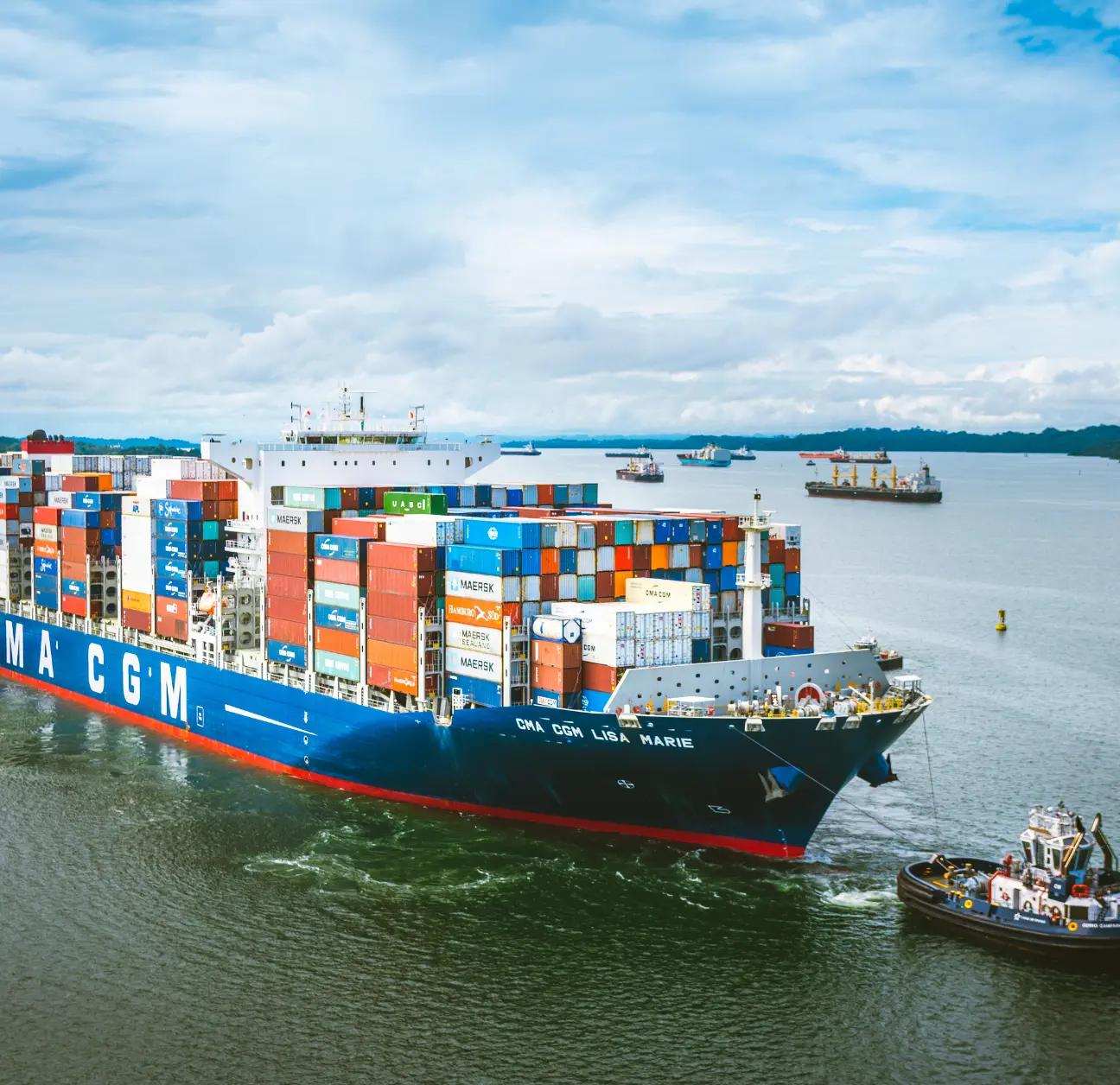Seamlessly integrate your TMS, ERP or any other platform in your ecosystem with your customers, partners, or software vendors, so you can offer environmental impact data and stay ahead of SEC regulations.
Environmental Supply Chain Management
Supply chain management can be complex, to say the least. There are so many different moving components involved with getting materials from one place to the next, and finally to their end destination. Running a successful supply chain requires cooperation from key stakeholders at every stage of the process. Ensuring the smooth transfer of goods and materials takes time and effort, and things may change on a constant basis. When considering environmental supply chain management, it’s also important to think about sustainability and how you can create a more eco-friendly supply chain. This will allow you to more easily determine the environmental impact of your product's journey through the chain.
Some of the most pressing environmental factors affecting supply chain management include the cost of production, customer expectations, and government regulations on CO2 emissions. Sourcing materials is getting more expensive by the day, and disruptions in the global supply chain have made it even more difficult for businesses to get what they need when they need it. In addition, many environmental issues in logistics industry management stem from the fact that customers are demanding more and more. Today, they expect that ordered items will be at their front door within a few days of purchase. Needless to say, this has put enormous pressure on supply chains to deliver—which often results in environmental harm.
By prioritizing sustainability, those in environmental supply chain management can meet these evolving expectations while keeping costs down and reducing their carbon footprint. Taking the steps now to mitigate harm down the road can really pay off for your business, and so it’s a good idea to make a plan for how you’re going to manage sustainability in the short and long term. There are different tools and strategies you can use to achieve your desired outcomes, so it’s important to consider your specific needs and objectives.
Supply Chain Sustainability Meaning
Simply put, supply chain sustainability meaning is rooted in reducing a company’s carbon footprint and creating practices within the supply chain to minimize the impact on the environment. This looks different for different organizations, so it’s worth considering your specific needs and business practices to determine the most effective pathways for creating greater sustainability in your supply chain. Searching “sustainable supply chain management meaning” or “supply chain environment meaning” can give you a better understanding of environmental supply chain management.
Environmental, social, and governance (ESG) for supply chains refers to a three-pronged approach by which companies tackle issues across the supply chain. It accounts for materials’ entire journey through the chain and helps businesses focus on building more ethical, sustainable supply chains. While the environment is a critical aspect of doing so, organizations should also be mindful of the social and governance components of supply chain improvement. The ESG model prioritizes all three so that businesses can work towards multiple types of sustainability. This model can be extremely helpful for those working in sustainable supply chain companies that are aiming to do more with the tools and resources that are already available to them.
Sustainability in Supply Chain Examples
Sustainability in supply chain examples can give you a better understanding of sustainability and how it relates to supply chains. Henkel, a German business that sells consumer products and chemicals, is a prime example of a company that has built a sustainable supply chain. They have taken their efforts beyond carbon neutrality to actually remove carbon dioxide from the atmosphere. They also have a goal of running entirely on renewable energy by 2030. Other companies with sustainable supply chains include Cisco and Nestle. Organizations like these are leading the way in sustainability, setting an example for businesses everywhere to follow. For many logistics service providers, having a better understanding of their supply chain digital nervous system helps them create a plan toward a greener supply chain.
Viewing green supply chain management examples or sustainable supply chain practices examples is key to improving your own business practices. For instance, if you want to invest in sustainable sourcing in supply chain management, you might look at cases where other businesses have successfully transitioned to sourcing materials in a cleaner way. Following the example of other companies can be extremely helpful when coming up with your own sustainability strategy, so it’s important to look around you for inspiration. This is especially true for businesses that lack prior experience in this area.
Green Supply Chain
Creating a green supply chain is easier said than done. There is so much to account for when transitioning to eco-friendly solutions, and for many businesses, it might seem that the time and effort this takes are not worth the results. However, by understanding the importance of green supply chain management, you can help your company work towards better practices that are good for the environment, as well as your bottom line. In this way, green supply chain management is really about increasing efficiency for all involved while allowing businesses to reduce their carbon footprint.
The benefits of green supply chain management are extensive. First and foremost, it can help you reduce your environmental impact. This is not only key to combating climate change and other environmental risks but protecting your brand reputation and positioning your company as a leader in sustainability. By prioritizing green management, you also open the door to new business partnerships.
Customers will also appreciate your commitment to the environment and may be more likely to purchase your products and recommend your brand to others. Implementing green initiatives in their supply chains is one of the best things that companies can do in the modern age to promote business growth.
Sustainability Supply Chains: Key Challenges
So what is sustainable supply chain management, and what are some of the barriers to a sustainable supply chain in today’s world? Sustainable supply chain management is the process by which companies work towards creating a greener supply chain. This most often involves sourcing cleaner materials, eliminating greenhouse gases, and ensuring that products hit shelves with as little impact on the environment as possible. Environmental regulations on the supply chain have helped business reduce their carbon footprint, but there are still number of challenges that organizations face when trying to create greener processes.
Understanding some of the major challenges and the importance of sustainability in supply chain management is critical to improving your supply chain.
For example, one of the biggest obstacles companies face today is cost. It’s no secret that going green can be incredibly pricey. Having to replace materials and work around carbon reporting regulations can take a toll on your finances. Many businesses also struggle with alignment and keeping all stakeholders on the same page. Just because you care about creating a supply chain doesn’t necessarily mean that others in the chain share your vision.
Lack of monitoring tools and complex integrations are another challenge that businesses are having to contend with. Supply chains are complex, and ensuring that the right protocols are followed throughout the chain can be extremely difficult. Specialized software can help you stay on top of your workflow, and even automate critical tasks. Rather than trying to keep track of your entire supply chain by hand, you can view activity through a centralized dashboard that brings all elements of the chain together in one place. That way, you can make sure that green practices are followed at each stage of the process and quickly make changes to whatever needs your attention.
Importance of Sustainability in Supply Chain
The importance of sustainability in supply chain management lies in the fact that, in today’s world, businesses need to invest in cleaner solutions to stay afloat. Bound by more and more regulations, organizations are being forced to reevaluate how they move materials through the supply chain and determine what they can do to invest in a greener future. Understanding sustainability's importance is crucial to protecting the environment. It can lead to new and exciting opportunities for stakeholders and benefit the world as a whole by helping to create cleaner solutions.
Chain.io offers a robust network that helps power smarter supply chains and gets businesses one step closer to achieving their sustainability goals. Different organizations use different technologies to manage their supply chains, and this makes communicating with other companies difficult. Chain.io removes these barriers and allow businesses to integrate tools, communicate more effectively, and ultimately transform their supply chains for the better. The platform’s universal adapter enables users to seamlessly integrate their ERPs, TMSs, and other platforms in their ecosystems. By keeping track of your supply chain this way, you can work towards your sustainability goals and continue delivering on promised quality while minimizing your impact on the environment.
Chain.io also has premapped integrations to EcoTransIT World, he most widely used software worldwide for automatic calculations of energy consumption, carbon emissions, air pollutants, and external costs. With EcoTransIT World integrations from Chain.io, forwarders can exchange shipments with:
- Altana AI
- CargoWise One
- Descartes Portrix and IES
- Flexport
- Magaya Supply Chain
- Rippey.ai
- Shipamax
- and more
Sustainability will undoubtedly shape the future of the supply chain, and so the onus is on corporations to invest in greener materials and processes to reduce their carbon footprint. Data integration tools can help make this easier. For example, carbon data integration software will allow you to easily track carbon emissions throughout the supply chain. Instead of having to calculate this by hand, you can automate monitoring and keep your team aligned on common objectives. Software like this can also facilitate more efficient communication with stakeholders and business partners with a vested interest in your supply chain.







